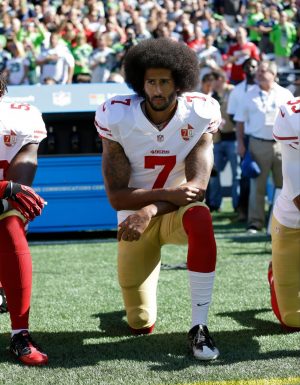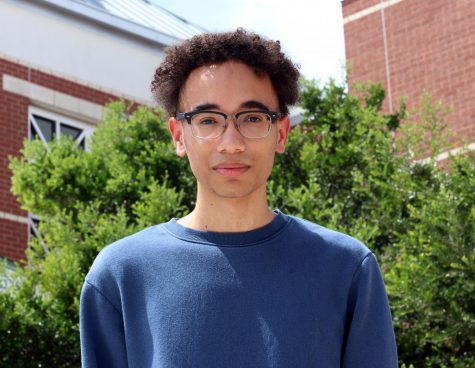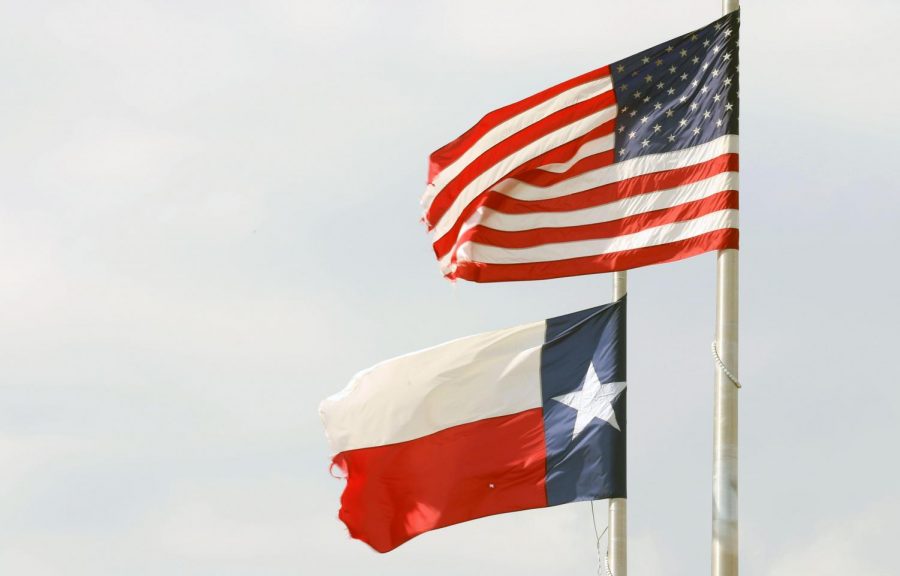Dealing with Kneeling
Controversy surrounding kneeling ensues on March 3, National Anthem Day
Eighty-nine years ago, the U.S. adopted “The Star-Spangled Banner” as its national anthem, written by Francis Scott Key during the War of 1812. Watching U.S. soldiers under bombardment from British forces raise an American flag, Key was inspired to write the song. With the wave of patriotism and nationalism brought about by WWI, the song was officially adopted 117 years later on March 3.
Many remember in 2016 when Colin Kaepernick refused to stand for the national anthem to protest police brutality and racial injustice faced by Black Americans. This seemingly harmless act set off a wave of controversy throughout the nation. Four years later, with renewed attention to social justice reform and racial disparities, the controversy ensues and people continue to kneel. The unjust deaths of George Floyd, Ahmaud Arbury, Breonna Taylor and others have only added fuel to the fire.

When Kaepernick first took a knee in 2016, I was shocked and didn’t understand why he would do such a thing. Standing for the national anthem is so ingrained in our society that I never considered anyone not doing it. It was the norm for me and part of a routine which I felt compelled to follow. I remember the vicious backlash he received and I remember supporting it because I knew we stood for the anthem to honor our veterans.
What I didn’t know was the reasons why he kneeled. I didn’t understand the unjust caste system he was fighting against or the web of police brutality incidents he was protesting. All I knew was that social media said it was bad, so I agreed.
But, as I took the time to look into his reasoning, I actually came to support and admire him. He stood up for what he believed in to bring attention to the disenfranchised of this country, and risked everything for it. If anything, this act of standing up for what you believe is right is the embodiment of American ideals.
However, just like many other aspects of American society, this act of refusing to stand for the national anthem has somehow been politicized. People on the right stand for the national anthem because they’re “patriotic,” while people on the left kneel because they “hate America.”
I personally find this narrative startling. It has somehow become a false dilemma where you either stand for the anthem or you’re disrespecting America. This not only makes it an extremely divisive issue, but it turns attention away from the real reason people are protesting. Instead of focusing on reforms, all attention is on the debate over whether kneeling is disrespectful or not. This needs to change.
Before athletic games, students and parents are expected to stand up and place their hand on their heart to pay respects while the national anthem is played. Yet students, like senior Dalyn White, have begun questioning the meaning behind the national anthem and have chosen to kneel during it.
“Before [our football team] kneeled [during the national anthem], everybody went to the endzone and we had a moment of silence while we took a knee,” White said. “Later, when the national anthem started playing, we also took a knee. I’m happy they let us express our freedom of speech, and while it did make some people angry, the meaning was to show that although we’re playing football, we still care about other issues in the world.”
One claim which people like to make is that kneeling is disrespectful, but, in reality, its never been seen as a sign of disrespect until now. If anything, people who kneel are taking part in a tradition which stretches back to the Civil Rights Movement. In the 1950s and 1960s, African-Americans staged ‘kneel-ins’ in front of white churches to get them to notice the cruelty of segregation and need for reform. Just like back then, people are kneeling as a sign of solidarity, not as a sign of disrespect.
“I don’t feel like it’s disrespectful or hurting anyone,” Black Student Union Sponsor Alisha Hensley said. “It’s not any type of racial slur or vocal hate to others, it’s just a form of silent protest.”
Many people say kneeling disrespects those who fought for us, which I also don’t see as true. Although military personnel and veterans deserve our respect and appreciation, they also fought for peoples’ freedom to use their first amendment right to protest.
JROTC instructor and retired petty officer first class Harold Wilcox said he sees both sides of the conflict, but doesn’t consider kneeling to be disrespectful.
“I understood Colin Kaepernick’s [and other people who kneel] actions and purpose,” Wilcox said. “It isn’t to bring disrespect to our flag, our veterans or our nation. It is to bring attention to police brutality and social and racial injustice [toward] black people.”
People who kneel often cite the racist background of Francis Scott Key and history behind “The Star-Spangled Banner.” Although the national anthem’s origin and author are undoubtedly racist, it’s ideals and message provide something for everyone to strive toward. If people took the time to research why others kneel and then compared it to the national anthem’s message of fighting for a better future and perseverance, they would see how much the two have in common. Just like in 1814, people are fighting for what they believe in.
“I believe that we, as a people, have to continue to strive to understand why things are happening,” Hensley said. “Researching the backstory to Kaepernick kneeling and why the movement started instead of taking it as a sign of disrespect is important.”
Although I am African-American, I chose to turn a blind eye to a lot of subtle racism I saw and chose to ignore politics until recently. I would say I have enjoyed some degree of privilege considering I am biracial, so I have not experienced much racism like many of my black friends. So, in many regards, 2020 was a wake up call for me on the injustices faced by many in this country. Although I vividly remember feeling bad about the deaths of people like Trayvon Martin, I never really considered the significance of what was happening and how much change was needed in this country. Bringing attention to this need for change is why people kneel, and although it may be controversial, it has helped propel forward a nationwide debate on race and led to meaningful strides.
So kneel, or stand, as long as you understand other people’s reasoning and respect their choices. Don’t contribute to America’s increasing polarization; both sides have valid points and want to see the country improve. Kneel to bring attention to social justice issues, while pushing for reform. Or stand to honor those who died for us, while also pushing for reform. Both options help.
As long as we’re able to respect each other’s choices and get past this never-ending debate, we can focus on pushing for meaningful change for the disenfranchised in this country.

Senior Ian Wright is the opinion section editor and this is his second year on staff. He enjoys listening to music, traveling to new places, watching Netflix...





Tyrone • Mar 6, 2021 at 4:00 PM
I liked your article. I’m a POC and I think it’s still extremely disrespectful to kneel during the anthem. There is no such thing as a perfect country, and the US certainly isn’t perfect. However, it is arguable that the US is the best country one can be living in. It was founded on principles of liberty and freedom, and our soldiers have fought to preserve our way of live for hundreds of years. Even the poorest Americans are richer than most of the world. Additionally, a middle-class lifestyle is practically guaranteed as long as you work hard and don’t make poor life decisions. The article says that it is not about disrespect, but I disagree. However, it is more about sending a message: that America hates people of color. And that is simply not true. It is a dangerous message to be sharing.
Colin Kaepernick was kicked from the NFL since apparently NFL owners are racist against backup quarterbacks who don’t throw well. As terrible as police brutality is, it is extremely rare. The media blows a single event out of proportion and make it seem like a widespread issue. The police don’t exist to persecute people of color. Sure, there are some bad cops, but there are also bad people. The police risk their lives in keeping their communities safe. It is extremely dangerous that the term “ACAB” is being more associated with BLM.
When MLK Jr. protested the discrimination of blacks on city buses, he protested city buses, not the United States. He did not denigrate the flag or the anthem. It is self-defeating to young people of color to think that they live in a country where they are constantly oppressed. I believe white people are also being hurt. There is a mantra of extremist white privilege and the hatred towards white Americans don’t make social justice any matter. In fact, it is only hurting and dividing more and more people. It is a shame that middle schoolers and high schoolers are also kneeling for an injustice they have never even faced. They’re kids who have lived in the comfort of their homes. But they still think that they are being oppressed by society.
People have the freedom to do what they want in the US. Even if it is kneeling to the American flag. Imagine disrespecting China, North Korean, or Iran. Those who criticize the US only look ungrateful of the opportunities and freedoms that the US provides to all citizens. I don’t want to live in a world where my brothers and sisters think that they are always oppressed and can’t achieve success because people like Kaepernick tell them that they can’t.